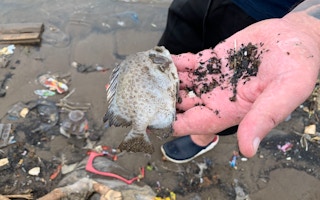As the latest round of negotiations for the first global treaty on plastic pollution gets underway in Ottawa, Canada, concern is mounting over the influence of the petrochemicals industry over the talks.
To continue reading, subscribe to Eco‑Business.
There's something for everyone. We offer a range of subscription plans.
- Access our stories and receive our Insights Weekly newsletter with the free EB Member plan.
- Unlock unlimited access to our content and archive with EB Circle.
- Publish your content with EB Premium.
“The petrochemical industry is aggressively promoting false solutions to the plastic crisis,” the Center for International Environmental Law’s (CIEL) senior attorney, Andres del Castillo, told Eco-Business.
“At the same time, they are spreading misinformation to delegations in an effort to derail the process and prevent provisions that are essential to meaningfully solving the crisis, such as caps on plastic production,” he said.
The participant list at the United Nations-led negotiations compiled on Friday by CIEL, a Washington DC-based environmental law non-profit, showed 196 fossil fuel and chemical industry lobbyists in attendance – a 37 per cent increase on the previous round of negotiations in November, signalling a ratcheting up of lobbying efforts by industry.
Petro-states including Russia, Saudi Arabia and Iran were credited with stalling the last round of negotiations in Nairobi, with the treaty text still unagreed around whether it will be based on a “full lifecycle” approach – in other words, to include limits on plastic production through bans such as the one introduced in Hong Kong this week.
The petrochemicals industry is banking on plastic production to sustain profit growth. Petrochemicals, from which plastics are made, now account for 14 per cent of oil use, and are expected to drive half of oil demand growth between now and 2050, according to the International Energy Agency (IEA).
Environmental groups including Greenpeace and CIEL are calling for a 75 per cent reduction in plastic production by 2040 compared to a 2019 baseline to stop ocean pollution and achieve climate goals.
Plastics currently account for 3 to 8 per cent of global greenhouse gas emissions, and are projected to consume 13 per cent or more of the planet’s remaining carbon budget to keep warming below 1.5°C as polymer consumption rises.
Ahead of the talks in Ottawa – a final round of negotiations will take place in Busan, Korea in November this year – industry players have been pushing recycling as a remedy to the plastic crisis, but NGOs argue that it is a “false solution” since only 9 per cent of the 380 million tonnes of plastics produced annually is recycled.
BASF, the world’s largest chemicals firm, said the treaty should include a “combination of binding and non-binding elements” to prevent plastic pollution, a harmonisation of definitions and reporting procedures for the lifecycle of plastics, and foster recycling with a “technology-open” approach.
“We ask the United Nations to consider input from industry when developing guidance on plastic topics such as product design, resource efficiency optimisation, waste management, and use of recycled content,” the company told Eco-Business, but made no mention of measures to limit production.
The Alliance to End Plastic Waste, a non-profit backed by producers including ExxonMobil, Dow, Chevron and Shell, said that “all parts of the value chain need to be addressed” in the treaty negotiations, and added that its focus is “largely on mid- and downstream work towards a circular economy”.
ExxonMobil referred Eco-Business to a report published last week by trade body International Council of Chemical Associations on the impacts of a cap on virgin plastics production, which predicted “negative effects across industry in general and on broader global economies.”
Unilever, one of the world’s biggest users of plastic packaging, pointed to a social media post by chief executive Hein Schumacher in which he called on governments to adopt a legally binding treaty that covers the full lifecycle of plastic products.
A recent survey by Greenpeace found that countries that are vulnerable to plastic pollution, such the Philippines, Indonesia, India and Thailand, were highly in favour of cuts to plastic production to address the plastic crisis.
Binding treaty “not likely”
Doug Woodring, managing director of Hong Kong-based non-profit Ocean Recovery Alliance and an observer at the talks in Ottawa, said that the prospect of a treaty co-signed by 180 countries was “a big and a significant advancement” towards fighting plastic pollution, but he was not hopeful of a legally binding agreement.
“Will the treaty be binding? Not likely. Will it be voluntary? Likely,” he said.
“Will every country move at the same pace then? Not likely. But, many will move and act, and others will follow, particularly when there are trade regulations implemented – which there will be.”
Woodring has previously argued that treaty negotiators should be careful not to stymie international trade in post-consumer plastic or risk cripping an already-weak recycling market. In Asia, recyclers have been struggling to achieve scale as consumer brands have rolled back targets for recycled content amid low oil prices.
The European Union will be one of the key territories driving minimim recycled content limits at the treaty, Woodring said, pointing to the EU’s plans to mandate a 25 per cent target for recycled content in plastic bottles by 2025 and 30 per cent by 2030.
Woodring said Extended Producer Responsibility (EPR) measures are likely to gain traction in the negotiations, building on momentum gained in countries such as the Philippines and Vietnam, which have recently introduced such “polluter pays” laws.
“The question with EPR is which countries get such laws implemented, and actually do it well. The Philippines has tried, but it has loopholes for cheating the system,” he said.
This story has been updated with new data on the number of fossil fuels and chemicals industry participants at the plastic treaty talks in Ottawa.








